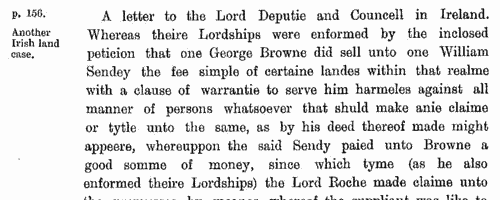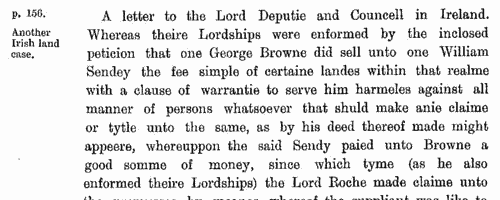Braunche Surname Ancestry ResultsOur indexes 1000-1999 include entries for the spelling 'braunche'. In the period you have requested, we have the following 38 records (displaying 21 to 30): Single Surname Subscription | | | Buying all 38 results of this search individually would cost £160.00. But you can have free access to all 38 records for a year, to view, to save and print, for £100. Save £60.00. More... |
These sample scans are from the original record. You will get scans of the full pages or articles where the surname you searched for has been found. Your web browser may prevent the sample windows from opening; in this case please change your browser settings to allow pop-up windows from this site. Early records of Wells cathedral, in Somerset
(1001-1500)
Three early registers of the dean and chapter of Wells - the Liber Albus I (White Book; R I), Liber Albus II (R III), and Liber Ruber (Red Book; R II, section i) - were edited by W. H. B. Bird for the Historical Manuscripts Commissioners and published in 1907. These three books comprise, with some repetition, a cartulary of possessions of the cathedral, with grants of land dating back as early as the 8th century, well before the development of hereditary surnames in England; acts of the dean and chapter; and surveys of their estates, mostly in Somerset.BRAUNCHE. Cost: £6.00.  | Sample scan, click to enlarge

| Somerset testators and legatees
(1501-1530)
Somerset was almost coextensive with the diocese of Bath and Wells, which exercised local probate jurisdiction through its consistory and archdeaconry courts: but superior to the diocese was the province of Canterbury. Somerset testators who also had property outside the county had their wills proved in the Prerogative Court of Canterbury (PCC). The Somerset Record Society embarked on a program of publishing genealogical abstracts of the registered copy wills of Somerset testators in the PCC archives, and in 1903 (volume xvi) printed abstracts edited by the Reverend F. W. Weaver from the PCC registers 1501-1503 (register Blamyr), 1504-1506 (Holgrave), 1506-1508 (Adeane), 1508-1511 (Bennett), 1511-1514 (Fetiplace), 1514-1517 (Holder), 1517-1520 (Ayloffe), 1520-1522 (Maynwaryng), 1523-1525 (Bodfelde), 1525-1528 (Porch) and 1529-1530 (Jankyn). In addition, the volume includes abstracts of 48 Somerset copy wills in the registers of the Archbishops of Canterbury at Lambeth Palace Library from 1363 to 1491. The heading of each abstract gives the year of making the will (not the year of probate) and the testator's name in bold. Below that is the quire number and name of the PCC register. Date and details of probate are given at the foot of each abstract. Spellings of surnames are preserved as they appear in the registered copy wills, and may vary within a single document.BRAUNCHE. Cost: £4.00.  | Sample scan, click to enlarge

| London Liverymen: Skinners
(1537)
J. Caley, F.R.S., F.S.A. transcribed this 'curious record' found in the Chapter House, Westminster, 'a list of the freemen of the various companies resident in London and Westminster; from Thomas Lewyn being mentioned as sheriff, it appears it was made in the year 1537.' Thirty-seven companies are listed, comprising 2400 individuals: Armourers, Bakers, Barber Surgeons, Blacksmiths, Brewers, Broiderers, Clothworkers, Coopers, Cordwainers, Curriers, Cutlers, Drapers, Fishmongers, Fletchers, Founders, Freemasons, Fruiterers, Goldsmiths, Grocers, Haberdashers, Innholders, Ironmongers, Joiners, Leather Sellers, Merchant Taylors, Painter Stainers, Plasterers, Plumbers, Saddlers, Salters, Skinners, Spurriers, Tallow Chandlers, Tilers, Vintners, Wax Chandlers and Weavers. BRAUNCHE. Cost: £6.00.  | Sample scan, click to enlarge

| Freemen of London
(1540-1550)
The long series of mediaeval registers and books of admission of the freemen of London was destroyed by fire in 1786. Thirty surviving charred leaves were gathered together and rebound, becoming Egerton MS 2408 in the British Museum. The order is jumbled and generally speaking none can be dated with certainty, although all belong to the very end of the reign of Henry VIII and the start of the reign of his son, Edward VI. These are pages from the admission books. Each entry here usually gives the name of the person admitted to the freedom; his father's name, address and occupation; his entitlement to the freedom, usually by having served out an apprenticeship to a citizen, naming the master and his trade. Then there may follow a cross-reference to M. or N., being two volumes of another set of official books denoted by the letters of the alphabet, and following each other in chronological sequence, which evidently gave details of entries into apprenticeships. These other books no longer exist: but the dates given for entry do identify the start of the apprenticeship, and so give by implication a date for the eventual admission to freedom. In the margin is the name of the city ward and the total of the fee and fine paid on admission.BRAUNCHE. Cost: £4.00.  | Sample scan, click to enlarge

| Tradesmen of York
(1272-1558)
No man or woman could trade in the city of York without having obtained 'freedom' of the city.Their names were recorded on the 'Freemen's Roll', or Register of the Freemen of the City of York, which contains about 19,900 names for this period. A list of names was prepared for each year, the year being here reckoned as starting at Michaelmas (29 September) until 1373, and thence at Candlemas (2 February). Each annual list starts with the name of the mayor and the camerarii or chamberlains. The chamberlains were freemen charged with the duty of receiving the fees of the new freemen; of seeing that only freemen traded in the city; and of preparing this roll, which was compiled from the names on their own account books from the receipts for the fees. There are three groups of freemen: those who obtained freedom after serving out an apprenticeship to a freeman; the children of freemen; and those who claimed freedom by 'redemption', i. e. by purchase or gift from the Mayor and Court of Aldermen.
BRAUNCHE. Cost: £2.00.  | Sample scan, click to enlarge

| London and Middlesex Feet of Fines
(1485-1569)
Pedes Finium - law suits, or pretended suits, putting on record the ownership of land in London and Middlesex.BRAUNCHE. Cost: £4.00.  | Sample scan, click to enlarge

| Liegemen and Traitors, Pirates and Spies
(1571-1575)
The Privy Council of queen Elizabeth was responsible for internal security in England and Wales, and dealt with all manner of special and urgent matters
BRAUNCHE. Cost: £4.00.  | Sample scan, click to enlarge

| Liegemen and Traitors, Pirates and Spies
(1591-1592)
The Privy Council of queen Elizabeth was responsible for internal security in England and Wales, and dealt with all manner of special and urgent matters
BRAUNCHE. Cost: £4.00.  | Sample scan, click to enlarge

| Liegemen and Traitors, Pirates and Spies
(1591-1592)
The Privy Council of queen Elizabeth was responsible for internal security in England and Wales, and dealt with all manner of special and urgent matters
BRAUNCHE. Cost: £4.00.  | Sample scan, click to enlarge

| Hastings family deeds
(1100-1600)
John Harley of the Historical Manuscripts Commission was invited by Reginald Rawdon Hastings to examine his family's extensive archives at the Manor House, Ashby de la Zouche, in Leicestershire. Harley produced a detailed calendar, of which is the first volume, published in 1928, Hastings himself having since died, and Harley having been killed at Gallipoli. This volume covers four categories of the records: the Ancient Deeds; Manorial and other Documents; Accounts and Inventories; and Miscellaneous Papers. Most, but not all, of the material is mediaeval. About half of the deeds relate to the family property in Leicestershire; then there are sections for Derbyshire, Nottinghamshire, Northamptonshire, Lincolnshire, Warwickshire, Staffordshire, Yorkshire, Northumberland, Norfolk, Cambridgeshire, Huntingdonshire, London, Wiltshire, Somersetshire, Devonshire, Buckinghamshire, Oxfordshire, &c. The manorial section includes a partitions of the estates of the Earls of Leicester and Wilton about 1204 and 1277; manor court rolls are mentioned, but not extracted. Choicer items from the family accounts and inventories are copied in extenso for 1596 and 1607, and thereafter summarised. Most of the later material is merely dipped into for curiosities.BRAUNCHE. Cost: £4.00.  | Sample scan, click to enlarge

|
Research your ancestry, family history, genealogy and one-name study by direct access to original records and archives indexed by surname.
|












